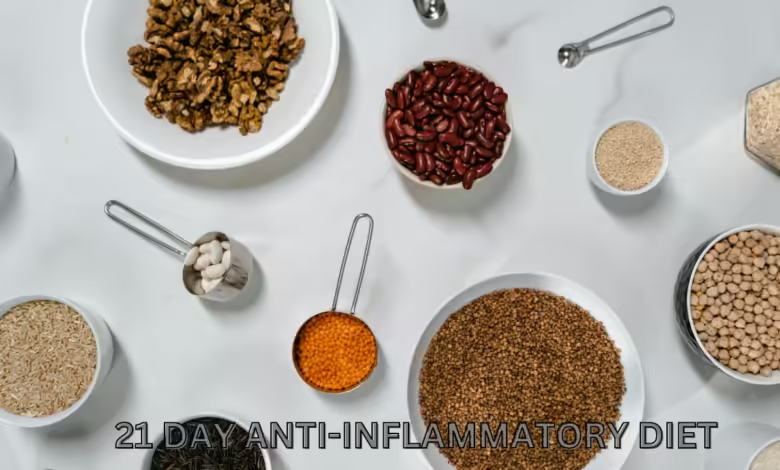Top Anti-Inflammatory Diet for 21-Day (free pdf) best foods to fight inflammation?

Are you looking for a way to boost your health, feel more energized, and reduce inflammation? The 21-day Anti-Inflammatory Diet might be just what you need! This diet focuses on eating foods that fight inflammation, which can help improve your overall health and reduce the risk of chronic diseases.
What is an Anti-Inflammatory Diet?
An anti-inflammatory diet is all about choosing foods that help lower inflammation in your body. It emphasizes natural, whole foods like fruits, vegetables, whole grains, and healthy fats while avoiding processed foods, sugars, and unhealthy fats.
Why a 21-Day Plan?
A 21-day plan is a great way to kickstart your health journey. It’s long enough to see significant changes in your body and habits but short enough to be manageable. Think of it as a reset button for your body!
The Science Behind Inflammation and Diet
What is Inflammation?
Inflammation is your body’s natural defense mechanism against injury and infection. However, chronic inflammation, which can be caused by poor diet, stress, or lack of exercise, can lead to various health issues, including heart disease, diabetes, and even cancer.
How Diet Affects Inflammation
The food you eat directly affects the levels of inflammation in your body. Consuming anti-inflammatory foods can help reduce chronic inflammation, while processed foods, high sugar intake, and unhealthy fats can exacerbate it.
Benefits of an Anti-Inflammatory Diet
Reducing Chronic Inflammation
The primary goal of an anti-inflammatory diet is to lower chronic inflammation in the body. This can lead to improved health, reduced pain, and decreased risk of chronic diseases.
Boosting Immune System
By focusing on nutrient-dense foods, this diet helps to strengthen the immune system, making it easier for your body to fight off infections and illnesses.
Promoting Weight Loss and Heart Health
An anti-inflammatory diet often leads to natural weight loss as it cuts out unhealthy foods. Additionally, it can help lower cholesterol and blood pressure, promoting overall heart health.
Key Components of the Anti-Inflammatory Diet
Whole Grains and Fiber
Whole grains like quinoa, brown rice, and oats provide essential fiber that helps in reducing inflammation and maintaining gut health.
Fresh Fruits and Vegetables
These are rich in antioxidants and vitamins, which are critical in fighting inflammation. Think berries, leafy greens, and brightly colored veggies!
Healthy Fats: Omega-3 and Omega-6
Incorporate healthy fats found in olive oil, avocados, nuts, and seeds to help lower inflammation levels.
Lean Proteins
Focus on lean proteins like fish, chicken, tofu, and legumes. These sources provide essential amino acids without adding saturated fats.
Foods to Avoid on an Anti-Inflammatory Diet
Processed Foods and Sugars
Highly processed foods and sugars are the main culprits behind inflammation. Avoid sugary snacks, sodas, and refined carbs.
Refined Carbohydrates
Bread, pasta, and pastries made from white flour can spike blood sugar levels and contribute to inflammation.
Saturated and Trans Fats
Limit intake of fried foods, margarine, and processed meats, which are rich in unhealthy fats.
Excessive Alcohol
While moderate wine consumption can have benefits, excessive alcohol can lead to inflammation.
21-Day Anti-Inflammatory Diet Plan: Week-by-Week Guide
Week 1: Introduction and Adjustments
Start by gradually cutting out processed foods, sugars, and unhealthy fats. Introduce more fruits, vegetables, and whole grains.
Week 2: Building Momentum
Increase your intake of lean proteins and healthy fats. Focus on experimenting with new recipes and incorporating more variety.
Week 3: Reinforcement and Lifestyle Changes
Solidify the changes by fully embracing the anti-inflammatory lifestyle. Pay attention to portion sizes and stay active.
Sample Meal Plan for 21 Days
Breakfast Ideas
- Oatmeal topped with fresh berries and chia seeds
- Green smoothie with spinach, banana, and almond milk
Lunch Options
- Quinoa salad with mixed greens, chickpeas, and olive oil dressing
- Grilled chicken with steamed vegetables
Dinner Recipes
- Baked salmon with asparagus and sweet potato
- Stir-fried tofu with broccoli and brown rice
Snacks and Beverages
- Nuts, seeds, and fruit slices
- Herbal teas and infused water
Tips for Sticking to the Anti-Inflammatory Diet
Meal Prep Strategies
Prepare meals in advance to avoid reaching for unhealthy options when you’re hungry.
Grocery Shopping Tips
Stick to the perimeter of the grocery store where fresh foods are located, and avoid the aisles with processed snacks.
Finding Delicious Alternatives
Swap out common inflammatory foods for anti-inflammatory options. Use honey instead of sugar, whole grain instead of white flour, etc.
Common Mistakes to Avoid
Overlooking Hidden Sugars
Check labels for hidden sugars in sauces, dressings, and packaged foods.
Not Drinking Enough Water
Staying hydrated is crucial for reducing inflammation and flushing toxins from your body.
Skipping Meals
Ensure regular meal times to maintain stable blood sugar levels and reduce inflammatory responses.
Exercise and the Anti-Inflammatory Diet
How Physical Activity Complements the Diet
Regular exercise helps reduce inflammation markers in the body, enhances mood, and supports weight management.
Recommended Exercises
Incorporate a mix of cardio, strength training, and flexibility exercises.
Monitoring Your Progress
Tracking Inflammation Markers
Consider consulting a healthcare provider to monitor inflammation markers in your blood.
Understanding Your Body’s Responses
Pay attention to how your body feels throughout the diet – reduced bloating, more energy, or better sleep.
Conclusion
The 21-day Anti-Inflammatory Diet is more than just a diet; it’s a lifestyle change that promotes health and well-being. By focusing on whole, natural foods and avoiding those that cause inflammation, you can reset your body and enjoy a healthier, happier life.




